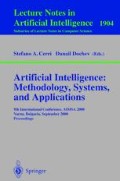Abstract
Decision trees are considered as an efficient technique to ex- press classification knowledge and to use it. However, their most standard algorithms do not deal with uncertainty, especially the cognitive one. In this paper, we develop a method to adapt the decision tree technique to the case where the object’s classes are not exactly known, and where the uncertainty about the class’ value is represented by a belief function. The adaptation concerns both the construction of the tree and its use to classify new objects characterized by uncertain attribute values.
Access this chapter
Tax calculation will be finalised at checkout
Purchases are for personal use only
Preview
Unable to display preview. Download preview PDF.
References
Breiman, L., Friedman, J. H., Olshen, R. A., Stone, C. J.: Classification and regression trees. Belmont, CA: Wadsworth, (1984)
Elouedi, Z., Mellouli, K., Smets, P.:Decision trees using the belief function theory. To appear in the Proceedings of the International Conference on Information Processing and Management of Uncertainty IPMU’2000(2000)
Lopez De Mantaras, R.: A distance-based attribute selection measure for decision tree induction. Machine learning 6 (1991) 81–92
Mellouli, K.: On the propagation of beliefs in network using the Dempster-Shafer theory of evidence. Ph.D dissertation University of Kansas Lawrence KS (1987)
Quinlan, J. R.: Induction of decision trees. Machine learning 1 (1986) 81–106
Quinlan, J. R.: Decision trees as probabilistic classifiers. Proceedings of the Fourth international Machine Learning (1987) 31–37
Quinlan, J. R.: C4.5: Programs for machine learning. Morgan Kaufmann San Mateo Ca (1993)
Shafer, G.: A mathematical theory of evidence. Princeton University Press (1976)
Smets, P.: Belief functions: the disjunctive rule of combination and the generalized bayesian theorem. International Journal of Approximate Reasoning 9 (1993) 1–35
Smets, P., Kennes, R.: The transferable belief model. Artificial Intelligence 66 (1994) 191–234
Smets, P.: The transferable belief model for quantified belief representation. D. M.Gabbay and Ph. Smets (eds.) Handbook of Defeasible Reasoning and Uncertainty Management Systems 1 Kluwer Doordrecht (1998) 267–301
Smets, P.: The Application of the transferable belief Model to Diagnostic Problems Int. J. Intelligent Systems13 (1998) 127–158
Author information
Authors and Affiliations
Rights and permissions
Copyright information
© 2000 Springer-Verlag Berlin Heidelberg
About this paper
Cite this paper
Elouedi1, Z., Mellouli1, K., Smets, P. (2000). Classification with Belief Decision Trees. In: Artificial Intelligence: Methodology, Systems, and Applications. AIMSA 2000. Lecture Notes in Computer Science, vol 1904. Springer, Berlin, Heidelberg. https://doi.org/10.1007/3-540-45331-8_8
Download citation
DOI: https://doi.org/10.1007/3-540-45331-8_8
Published:
Publisher Name: Springer, Berlin, Heidelberg
Print ISBN: 978-3-540-41044-7
Online ISBN: 978-3-540-45331-4
eBook Packages: Springer Book Archive

